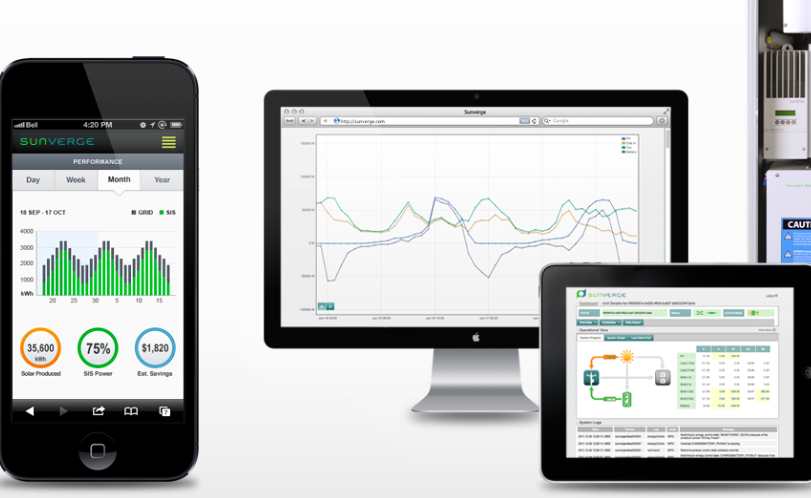Australian energy utility AGL Energy has spent $US20 million ($A28 million) snapping up a minority stake in US-based battery storage solutions provider Sunverge as it seeks to accelerate its push into distributed generation and rooftop solar and storage and smart software.
The purchase of Sunverge was announced at the company’s interim earnings presentation, along with a plan to create a new renewable energy investment fund which aims to build 1,000MW of new large scale renewable energy capacity.
The purchase of Sunverge, which follows the purchase of a stake in Australian start-up Solar Analytics, and coincides with the launch of a “solar” component of its smart App, comes as AGL looks to appeal to the emerging home energy market, particularly with competition from telcos such as Telstra also emerging.
New managing director Andrew Vesey has placed great store in the “new energy” division, which will focus on solar, storage, electric vehicles and the like, although its plans were set back when the division head, Marc England, announced his departure to head New Zealand group Genesis Energy late last year.
Vesey says AGL Energy is attracted to Sunverge because it is an emerging leader in demand response management for “premises-based energy storage”, and he saw it as an “early mover advantage” for AGL.
He is also attracted to the idea of a “virtual power plant”, where AGL could tap into the battery storage systems of – say – one million customers. “We are keen on the concept of a virtual power plant,” he told an analysts briefing.
Sunverge has already entered into some trials with AGL Energy and this investment will underpin a “strategic partnership.” In fact, it will become the “exclusive channel” in Australia for its products.
AGL is not the first Australian investor in the San Franciso-based Sunverge. Last year Sunverge finished a major fund raising that was led by Australia’s Southern Cross Venture Partners ($A15 million sourced from the Australian Renewable Energy Agency), along with German industrial giant Siemens and France’s biggest oil company Total.
The AGL funding forms the major part of a new round of funding totalling $US36 million.
Sunverge also has a partnership with SunPower, which is majority owned by Total, and its solar and storage pilot program with SunPower will include Australia. Sunverge is also involved in battery storage trials in 33 homes in three Queensland towns with Ergon Energy .
Vesey said AGL has been selling small number of household batteries to its clients, and is rapidly increasing sales of rooftop solar to consumers.
Sales of rooftop solar panels to households was up 2.5 fold from a year ago, albeit off a low base, and sales to commercial clients up four-fold. AGL says it is now among top three retailers of solar PV in the last quarter of 2015.
Vesey, however, suggested battery storage was the big game changer in home energy systems, particularly with the likelihood of big price falls in the future. Part of the attraction of the Sunverge deal and investment was the ability to manage those systems.
He said it was clear that consumers were looking at battery storage and AGL needed to as well, and be the one which “orchestrates those resources” and their value to the grid and shareholders.
Vesey said Sunverge’s energy solution will help the company better meet the needs of its customers in a carbon-constrained energy future.
“This future is increasingly based on decentralised products and services including digital metering, solar PV systems, as well as new technologies such as batteries, electric vehicles and other ‘beyond the meter’ energy solutions.”
 AGL also announced its “solar command App” developed by Solar Analytics, which it says will provide real time solar production, consumption and a “health check” for a homeowner’s solar system – as well as overall electricity and gas consumption.
AGL also announced its “solar command App” developed by Solar Analytics, which it says will provide real time solar production, consumption and a “health check” for a homeowner’s solar system – as well as overall electricity and gas consumption.
Sunverge CEO Ken Munson told RenewEconomy last year that he thought that battery storage costs would fall three times quicker than rooftop solar, although the key was in the software that went with the technology. As Munson mentioned in his interview with RenewEconomy, Sunverge is not looking to take consumers wholesale off the grid.
Ivor Frischknecht, the CEO of ARENA, which provided the funds for the Southern Cross investment into Sunverge, said the partnership will accelerate the rollout of “state of the art” integrated battery storage solutions in Australia.
“Residential battery storage is currently in its infancy in Australia,” he said in a statement. “While only a small number of systems are currently installed, there is a lot of interest in the technology.
“As storage becomes more commonplace in Australian homes, we expect to see energy retailers firm up business models for selling new products and work through some of the regulatory constraints facing Australia’s emerging storage market.
“Solving these challenges will ultimately allow consumers to get more value from their rooftop solar systems and increase the supply of renewable solar power in our electricity networks, contributing to grid stability and reducing peak load stress.”











